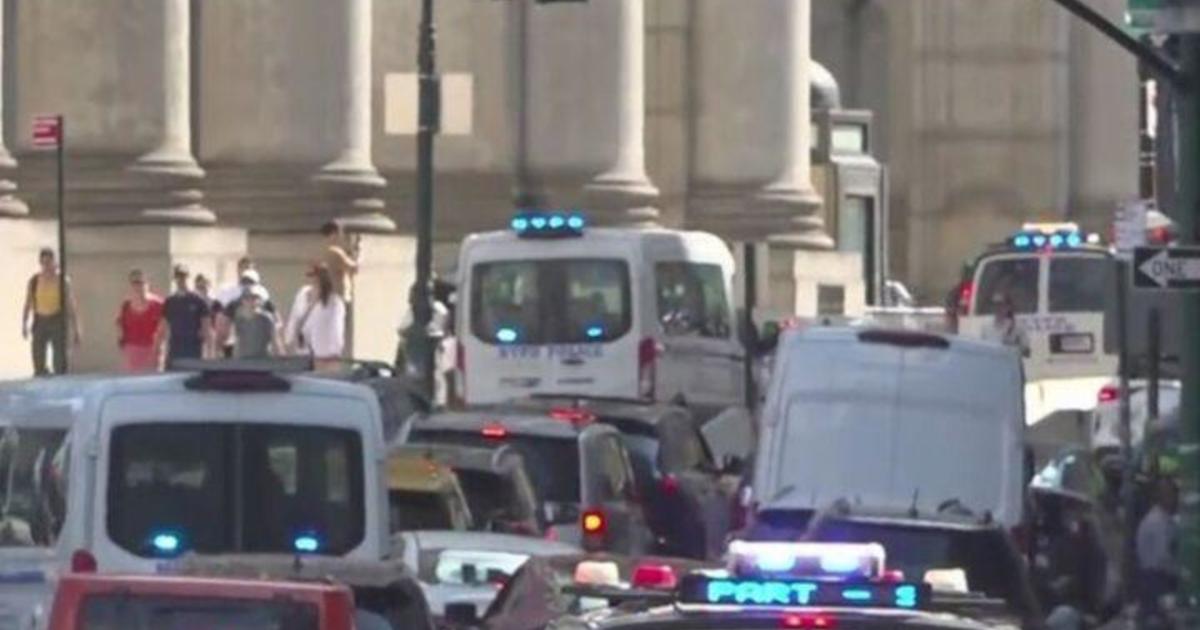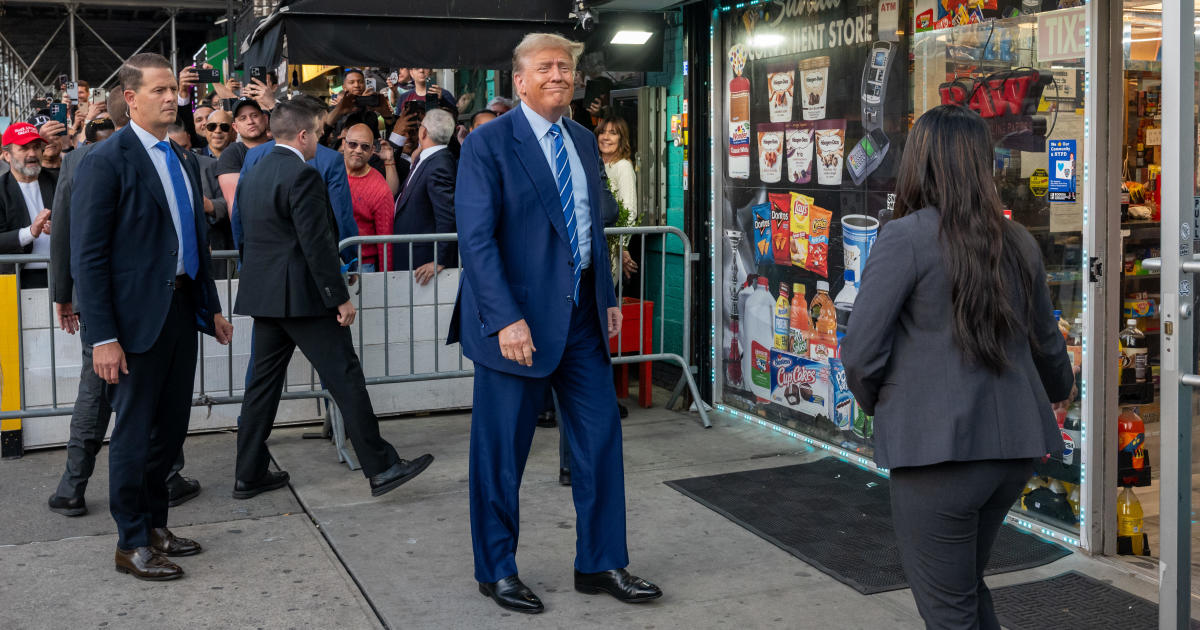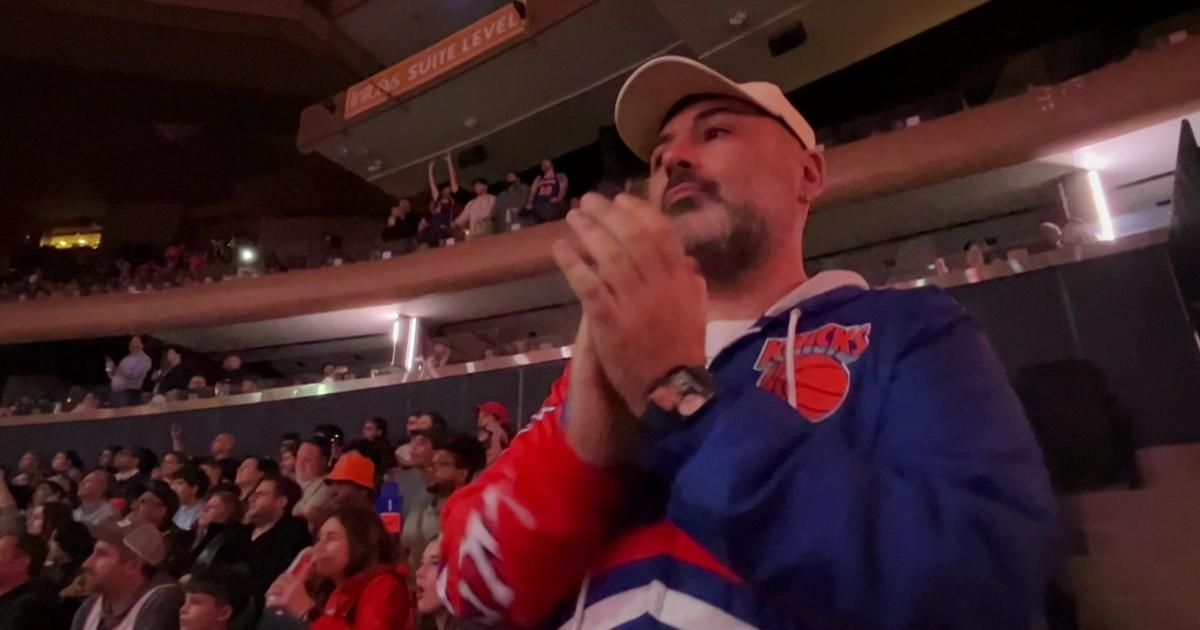GOP Candidates Spar Over Immigration, National Security, Deficit, Other Issues
CLEVELAND (CBSNewYork/AP) -- The top polling Republican candidates were duking it out Thursday night, as they took the stage for the first debate of the 2016 campaign.
The debate was heated from the moment it began. As CBS2's Marcia Kramer reported, the big question going into the very first Republican presidential debate was which Donald Trump would show up. The answer came right out of the box.
Trump began the debate by refusing to pledge his allegiance to the winner of the Republican primary in the 2016 general election if it was not him, and refusing to rule out a possible third-party run. He was the only one to do so.
He said, "I cannot say I have to respect the person" that wins "if it's not me."
Trump's remarks drew boos from the audience at the Quicken Loans Arena, and a rebuke from Rand Paul that Trump "buys and sells politicians of all stripes."
Shortly afterward, when co-moderator Megyn Kelly confronted Trump about some of his remarks about women, Trump said, "I think the big problem this country has is being politically correct."
Trump added: "Frankly what I say -- and oftentimes, it's fun; its' kidding; we have a good time -- what I say is what I say. And honestly Megyn, if you don't like it, I'm sorry. I've been very nice to you, although I probably could not be based on the way you've treated me, but I wouldn't do that."
And Trump himself later drew cheers when he said he would be the right person to fix the national debt. He pointed out that he pulled out of Atlantic City when it was clear that businesses there were going bankrupt left and right, as "Chris (Christie) can tell you."
"This country owes $19 trillion, and they need somebody like me to straighten out that mess," Trump said to cheers.
Trump also later slammed President Barack Obama's foreign policy as he spoke against the president's Iran deal and called it a "disgrace."
"We have a president who doesn't have a clue," Trump said. "I would say he's incompetent, but I don't want to do that, because that's not nice."
Trump further refused to back down from previous allegations that Mexico is sending criminals into the United States, though he skirted the challenge to provide evidence of that charge during the debate.
Trump also called for a wall on the Mexican border and credited himself with bringing attention to the issue of illegal immigration, Ohio Gov. John Kasich defended him.
He said Trump had "hit a nerve in this country," and anyone who tunes him out is "making a mistake."
For his part, former Florida Gov. Jeb Bush, a favorite of the party's establishment wing, defended his call for a path to legal status for people living in the U.S. illegally. It's an unpopular position among some Republican voters who equate legal status with amnesty.
``The great majority of people coming here have no other option,'' Bush said.
Many other remarks by candidates also drew thunderous cheers in the stadium, including calls by some candidates to restrict or ban abortion.
Former Arkansas Gov. Mike Huckabee said defunding Planned Parenthood was not enough, and claimed that the 5th and 14th amendments could be used as a means to ban abortion on the grounds that unborn children have been proven to be full-fledged persons based on DNA schedule research and are violating due process.
``It's time we admit the Supreme Court is not the supreme being,'' he said.
Huckabee was later asked about including transgender people in the military. He responded: "The military is not a social experiment. The purpose of the military is to kill people and break things."
He went on to say the military is "broken" and the focus should be on getting equipment up to date.
Florida Sen. Marco Rubio also emphasized his opposition to abortion.
He said he believes future generations will ``call us barbarians for murdering millions of babies.''
Rubio disputed the Republican presidential debate moderator's characterization that he opposes abortion except in the case of rape and incest. He says he has never advocated for those exceptions.
Meanwhile, Paul and New Jersey Gov. Chris Christie also got into a sniping match over surveillance by the National Security Administration. Christie argued that surveillance powers are necessary to protect the country, while Paul said the NSA was targeting everyday Americans.
"I want to collect more records from terrorists, but less records from innocent Americans," Paul said.
Christie said, "That is a completely ridiculous answer." He said Paul did not have real-world experience protecting people from danger, and "When you're sitting in a subcommittee just blowing hot air about this, you can say things like that."
Paul went on to slam President Obama, saying he did not trust Obama with data about everyday Americans, and pointing out the famous hug exchanged between Christie and Obama shortly after Superstorm Sandy.
"The hugs that I remember are the hugs to the people who lost their families on September 11, (2001)," Christie said.
The economy, the fight against ISIS, the Common Core education policy, and a variety of other issues were also addressed early in the debate.
At stake for Republicans in the debate was not only picking the candidate to represent them in the general election, but also selecting the direction the party will take as it seeks to regain the White House.
"You're starting off with a lot of candidates who have an initial group of support that reflect a particular element of the party, but nobody is close at this point to putting together a majority coalition,'' said David Winston, a Republican pollster.
As in the 2012 Republican primaries, the GOP faces a tug of war between those eager for a candidate with broad general election appeal and those who think the key to winning is nominating a fiery conservative.
But this time, the field of 17 candidates is both larger and more seasoned, making the choice Republicans will ultimately make less certain or inevitable than in past elections.
While Republicans say they relish their options, it's doubtful many expected Trump's summer surge
On average, Trump is polling higher than his two closest competitors, Bush and Wisconsin Gov. Scott Walker, combined, CBS2's Andrea Grymes reported.
"I'm not looking to hurt anybody," Trump said Wednesday. "I'm not looking to embarrass anybody. If I have to bring up deficiencies, I'll bring up deficiencies."
But political experts tell CBS2's Dick Brennan it may be time for Trump to go statesman.
"If you think that he's right now at 20 percent or so nationally in early states, his next thing is to try to go beyond that, build beyond his core support. And if you were being rational, the thing that you would do is you would start to look presidential," said Bloomberg Politics Managing Editor John Heileman.
Only 10 candidates were invited by debate host Fox News to participate in the main event, with the remaining seven relegated to a pre-debate forum.
They were Trump, Bush, Walker, Huckabee, Paul, Kasich, Rubio, Christie, Texas Sen. Ted Cruz, and retired neurosurgeon Ben Carson.
"I think what you're going to see is every candidate is going to have to bring their A game and it has to be done quickly and concisely," said Republican National Committee Chairman Reince Priebus.
Paul said earlier that he was ready to rumble.
"I like to mix it up, so my staff is all saying 'Oh no, we need to be cautious!' And I'm like 'I like to mix it up.' So I plan on getting into it with the other candidates," he said.
For Christie, it was probably less important for him to win the debate than it is for him not to lose it, WCBS 880's Peter Haskell reported.
"I think Chris Christie, if he's smart, wants to show himself as the policy walk candidate and then get out there, get on a plane to New Hampshire," said Monmouth University pollster Patrick Murray.
Christie Makes Cut For First GOP Debate
While the candidates pitch their visions for the Republican Party's future, they'll also be making the case that they would present the strongest general election challenge to Hillary Rodham Clinton, the frontrunner for the Democratic nomination.
Clinton was scheduled to be traveling during the debate and didn't plan to make a statement afterward. Her campaign was preemptively making the case that there was little difference between Trump's "outrageous'' positions and the rest of the field.
"They all have an identical agenda,'' said Joel Benenson, Clinton's chief strategist.
Thursday's debate is the first of six Republican Party-sanctioned debates scheduled before primary voting begins in February.
Fox News used five national polls to determine which 10 candidates would be on the stage, and several candidates were grouped together in the single digits, most separated by a number smaller than the polls' margin of error.
(TM and © Copyright 2015 CBS Radio Inc. and its relevant subsidiaries. CBS RADIO and EYE Logo TM and Copyright 2015 CBS Broadcasting Inc. Used under license. All Rights Reserved. This material may not be published, broadcast, rewritten, or redistributed. The Associated Press contributed to this report.)



